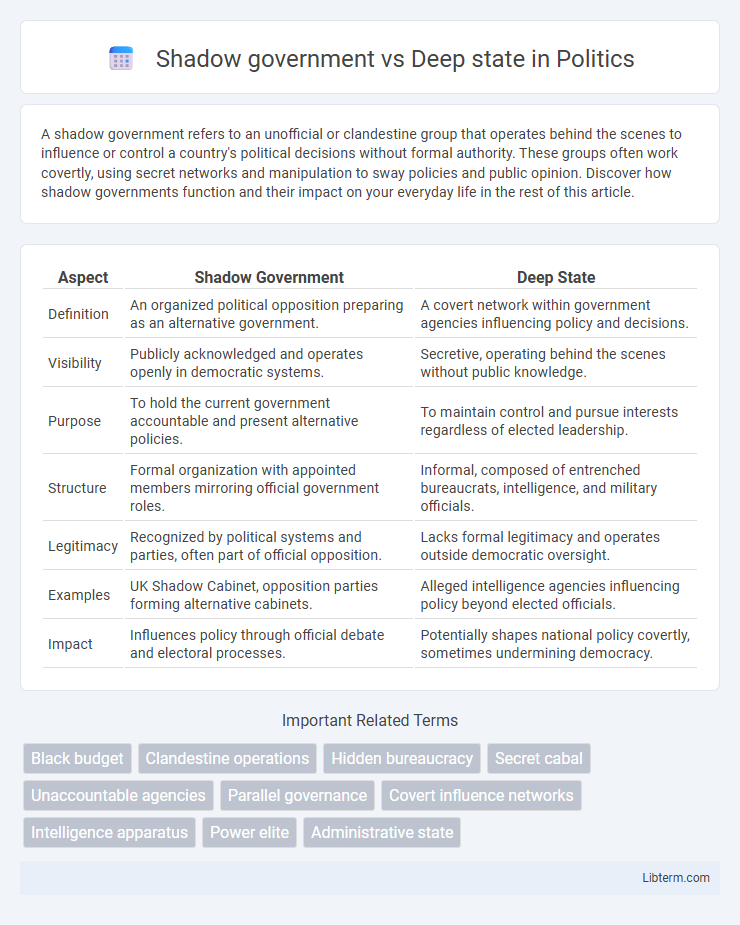A shadow government refers to an unofficial or clandestine group that operates behind the scenes to influence or control a country's political decisions without formal authority. These groups often work covertly, using secret networks and manipulation to sway policies and public opinion. Discover how shadow governments function and their impact on your everyday life in the rest of this article.
Table of Comparison
| Aspect | Shadow Government | Deep State |
|---|---|---|
| Definition | An organized political opposition preparing as an alternative government. | A covert network within government agencies influencing policy and decisions. |
| Visibility | Publicly acknowledged and operates openly in democratic systems. | Secretive, operating behind the scenes without public knowledge. |
| Purpose | To hold the current government accountable and present alternative policies. | To maintain control and pursue interests regardless of elected leadership. |
| Structure | Formal organization with appointed members mirroring official government roles. | Informal, composed of entrenched bureaucrats, intelligence, and military officials. |
| Legitimacy | Recognized by political systems and parties, often part of official opposition. | Lacks formal legitimacy and operates outside democratic oversight. |
| Examples | UK Shadow Cabinet, opposition parties forming alternative cabinets. | Alleged intelligence agencies influencing policy beyond elected officials. |
| Impact | Influences policy through official debate and electoral processes. | Potentially shapes national policy covertly, sometimes undermining democracy. |
Understanding Shadow Government: Definition and Origins
The shadow government refers to a purported secret network of influential individuals and institutions operating behind the official government to control policy and decisions without public accountability. Originating from Cold War-era conspiracy theories, it suggests that unelected elites manipulate political power, often involving intelligence agencies and corporate interests. Understanding the shadow government entails examining its role as an unofficial power structure that allegedly subverts democratic transparency.
What is the Deep State? Core Concepts Explained
The Deep State refers to a covert network of influential members within government, military, and intelligence agencies operating independently of elected officials to maintain control and influence policy behind the scenes. Core concepts include secretive coordination, resistance to transparency, and strategic manipulation of public institutions to preserve established power structures. This shadowy apparatus often functions through entrenched bureaucracies and clandestine operations, challenging democratic accountability.
Historical Roots: Shadow Government vs Deep State
The concept of a shadow government originates from Cold War-era fears of clandestine political control, symbolizing secretive groups influencing official policy behind the scenes. The deep state refers to entrenched bureaucratic networks within government institutions, historically noted in countries experiencing military coups or authoritarian regimes. Both terms reflect public mistrust toward opaque governance, with the shadow government emphasizing covert political elites and the deep state highlighting systemic institutional power.
Key Players: Who Operates Within the Shadow Government?
Key players operating within the shadow government often include influential figures from intelligence agencies, high-ranking military officials, and senior bureaucrats who wield significant power behind the scenes. Corporate leaders and political operatives also play crucial roles, leveraging networks to shape policy outcomes without public accountability. This covert alliance operates through secretive decision-making processes that bypass formal governmental channels, maintaining control over critical national and international affairs.
Deep State Mechanisms: How Influence is Exerted
Deep state mechanisms operate through covert networks embedded within government agencies, intelligence services, and private sector entities, leveraging bureaucratic inertia and classified information to shape policy agendas. Key tactics include strategic manipulation of media narratives, clandestine political lobbying, and selective enforcement of laws to maintain control without public accountability. These intertwined systems exert influence by exploiting institutional opacity and symbiotic relationships to steer national and international decision-making processes.
Similarities and Differences Between Shadow Government and Deep State
Shadow government and deep state both refer to covert power structures influencing official government policies and decisions without public accountability. The shadow government typically denotes a secret, organized group operating behind the scenes, often appointed or aligned with political elites, whereas the deep state implies entrenched bureaucratic or intelligence agencies acting autonomously to preserve their interests. Both entities share secrecy and influence, but the shadow government is usually viewed as a strategic alternative authority, while the deep state is considered part of the established government apparatus operating covertly.
Impact on Democracy and Governance
The shadow government and deep state concepts refer to covert groups or networks influencing political decisions beyond official democratic institutions, often undermining transparency and accountability. Their impact on democracy manifests in weakened public trust, distorted policy-making, and reduced citizen participation due to secretive manipulation of governance processes. By bypassing elected representatives, these entities challenge democratic norms, potentially leading to authoritarian tendencies and diminished effectiveness of formal governmental structures.
Real-World Examples and Alleged Incidents
Shadow governments and deep states are often cited in discussions about covert influence on political systems, exemplified by alleged incidents such as the 1970s Watergate scandal in the United States, which revealed hidden operations undermining democratic processes. In Turkey, the Ergenekon trials exposed purported deep state networks involving military and intelligence officials accused of plotting coups and manipulating politics. These real-world examples highlight ongoing concerns about clandestine entities wielding power beyond public accountability in various countries.
Media Portrayals and Public Perceptions
Media portrayals of the shadow government often depict a secretive cabal controlling political decisions behind the scenes, while the deep state is portrayed as entrenched bureaucratic networks subverting elected officials. These narratives influence public perceptions, fostering skepticism and conspiracy theories about transparency and accountability in governance. Studies show increased media focus on these themes correlates with declining trust in government institutions and heightened polarization.
Counteracting Influence: Transparency and Reform Efforts
Efforts to counteract the influence of the shadow government and deep state emphasize transparency initiatives, such as whistleblower protections and open government laws, to expose covert operations and hidden agendas. Institutional reforms targeting intelligence agencies and bureaucratic structures aim to enhance accountability and reduce unchecked power within these clandestine networks. Public oversight committees and legal frameworks play critical roles in dismantling opaque systems that undermine democratic governance.
Shadow government Infographic

 libterm.com
libterm.com